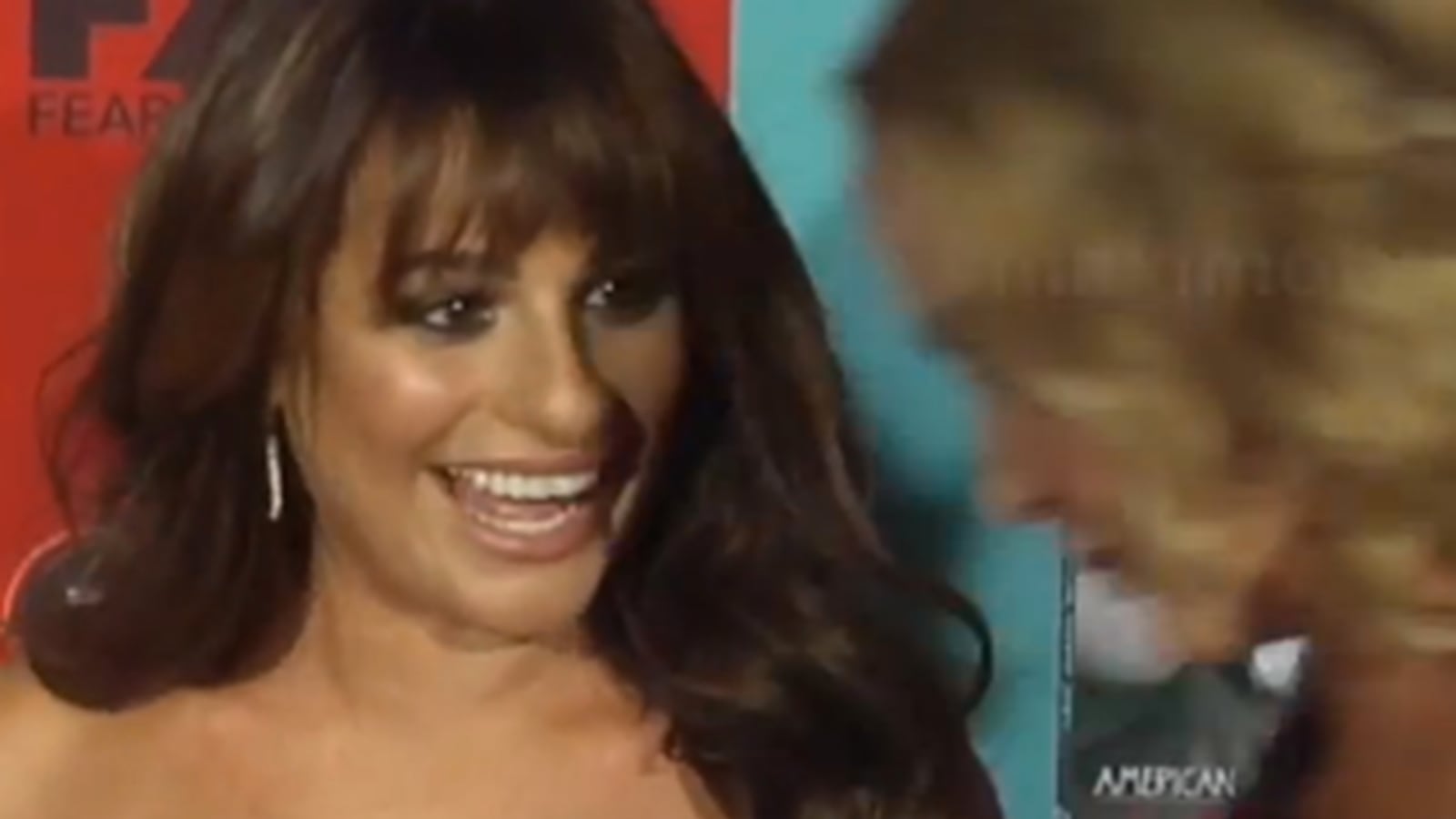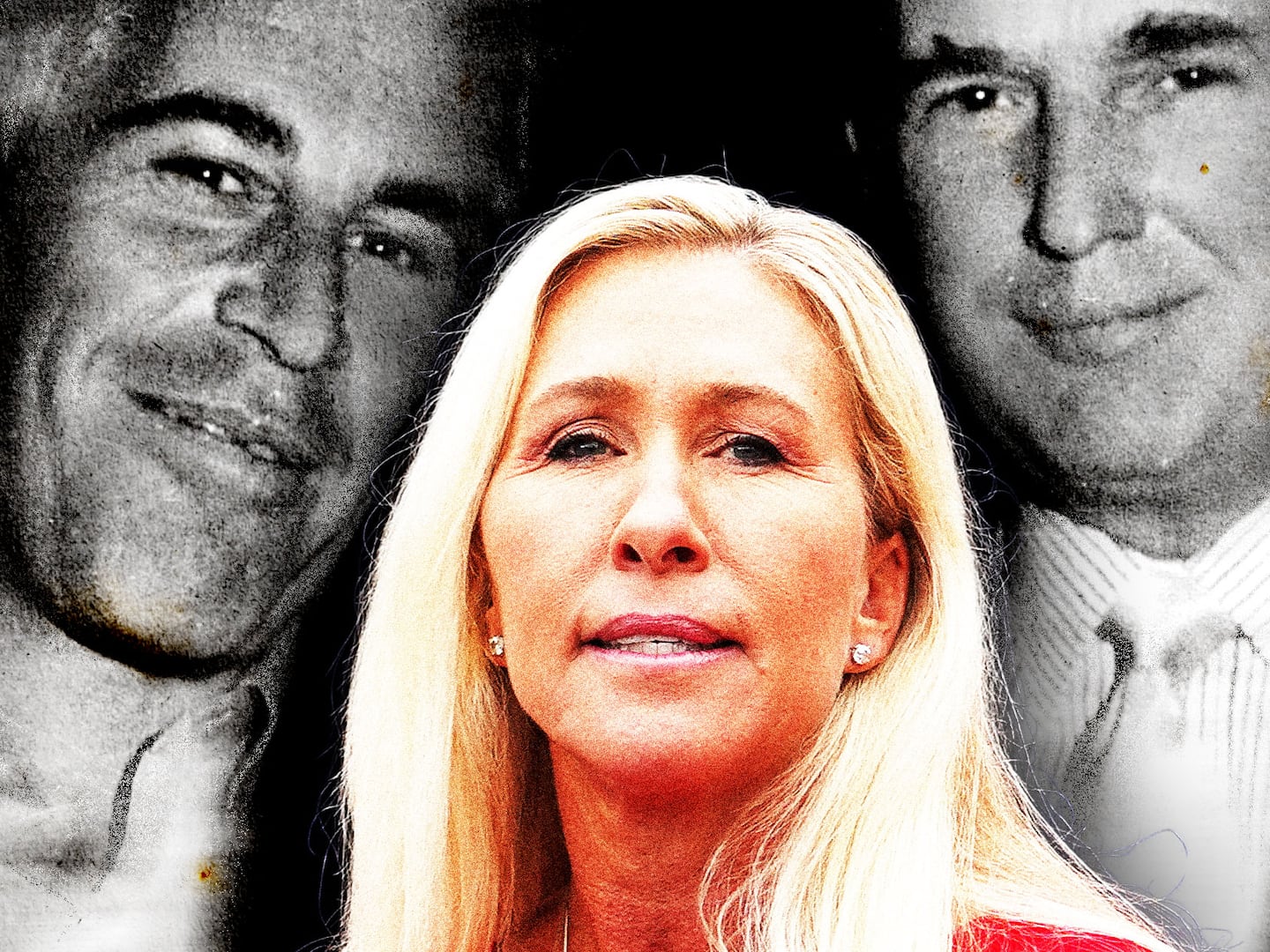If headlines could come with the sound of lip-smacking, then a puzzling moment on the red carpet involving Glee star Lea Michele apparently being dissed by Jessica Lange would have with a cacophony of them.
The women were attending the premiere of American Horror Story: Freak Show on Sunday, when Michele said “hi” and smiled at Lange, and Lange walked right past her without glancing her way. “That won’t fill her with Glee: Lea Michele snubbed by Jessica Lange as she tries to greet her at television premiere,” read MailOnline.
The contrast of Michele, hair tousled, in a low-cut dress, smiling glassily under the relentless flashbulbs against the cool dismissive air of the less bombastically dressed, head-down Lange was irresistible; plus, Michele is young and Lange a veteran, of course, and there’s nothing like a cool slapping down of puppyish youth by assured maturity.
Maybe Lange just wanted to get out of the way of Michele’s red carpet moment. Or maybe Lange didn’t like the red carpet of her show being hijacked by a star from another (even if Michele is rumored to be joining AHS’s cast for its fourth season).
The derision heaped upon Michele was immediate: internet commenters lobbed insults on her for her forced smile, for trying too hard, for how she looked, for how she posed, for how she was humiliated. Lange’s imagined diss was a perfect smackdown of all Michele stood for, regardless of whether or not it was intentional. If she did want to insult a fellow actor so publicly, doesn’t it say a whole lot more about her than it does about Michele—and none of it very flattering? If it was the diss the media imagines, it’s rather cruel to do it so publicly.
But whatever, this was yet another reason to laugh at Michele. There have been many stories about her diva behavior, and there are blogs devoted to attacking her—though commendably commenters interrogate the need for such things.
This year, there were rumors Michele had had a major dust-up with Glee co-star Naya Rivera, and when asked about it by David Letterman, she side-stepped giving a direct answer by saying how “overblown” some things in the media can become, and how the media likes to “pit women” against one another—which, regardless of the veracity of the Rivera rumors, is certainly true.
Michele herself once said that, having started her career on Broadway, “I came from a theater world where the word ‘diva’ was awesome.”
But her candor hasn’t engendered public warmth. Stories of her snapping her fingers during filming and saying, “Let’s go. I have plans,” don’t help, even if—as Michele claims—these stories are baseless. She is even, it has been deemed, “annoying on Instagram,” that most contemporary of heinous crimes.
For her part, Michele, in interviews, is eloquent, to the point, and assured. When she appeared on Ellen DeGeneres’s chat-show, she said that the rumors about her and Kate Hudson being at odds were nonsense; that Hudson had invited her to stay after the death of her boyfriend, fellow Glee star Cory Monteith. She talked about her need to work in the wake of her grief. As DeGeneres said, it’s hard enough to lose someone close to you, let alone do that in public as Michele had done.
“You can choose to fall from this, or you can choose to rise. I am trying to do my best for him, and to do my best and to make positive of where I go for the rest of my life,” Michele said.
But the public continues to not warm to her. Her polished professionalism is criticized, as if being a polished professional is a bad thing. She did not weep on cue in public when Monteith died, or seek sympathy. She does not claim to be rough around the edges, she doesn’t advertise her frailties, she maintains a distance with the public. She turns up and looks good at premieres, she acts, and does what she is required to do.
Lea Michele has not murdered puppies (that we know of), publicly said anything remotely offensive about anything, adroitly maintains a consistent performance as an annoying character on a hit primetime show, and on red carpets responds to photographers’ constant calls to look this way and look that way by looking this way and looking that way.
For doing all this, well, she is hated. The full footage of her on the red carpet yes, shows her posing, but posing to order. Despite the final frozen images we see in magazines and online, it literally sounds horrible, rather like the most hideous cattle-call. If her smile is fixed, it’s because she is being instructed, aggressively, to pose by a bunch of jackals with cameras. But even if she did enjoy it, even if she enjoys the attention, so what? Why shouldn’t she?
The construction and delight in Michele’s Jessica Lange humiliation recalled the Anne Hathaway pile-on around the time of the release of her new movie Les Misérables, in which she played the prostitute Fantine, when she was deemed to be too in control and practiced in how she conducted herself.
There were articles devoted to why people hated Anne Hathaway. She was the too-enthusiastic musical theater geek, too actress-y, too perfect, too like that annoying kid in class with their hand-up, and then too annoying for trying to make herself out to be not perfect after all—Hathaway couldn’t win. Trying to be ordinary, plain-spoken, and spontaneous made it worse.
At its zenith, following the awards season buzz around Les Misérables, the public mood against Hathaway even spawned a hashtag, as named by my colleague Kevin Fallon, “Hathahaters.” A paparazzi shot of her revealing that she was not wearing underwear at a Screen Actors Guild function was “devastating,” she said, adding to Matt Lauer on Today that the selling of the pictures by paparazzi was akin to the “unwilling” sexual commodification endured by Fantine. It was an excellent, pointed answer that even managed to advertise her movie. Would that all actors had Hathaway’s nimble intelligence.
The derision towards Hathaway peaked with her Oscars acceptance speech, which she reportedly practiced to make herself “more likeable.” But people didn’t like that she practiced, because apparently, the only way to really accept an Oscar is to trip on your dress, sound salty, or just be overcome and incoherent.
But what if you want to be measured? What if you want to thank the people you want to thank and make a tangy political point, too, as Hathaway did around the subject of prostitution? You practice your speech, and apart from her slightly OTT quavering opener—“It came true” (and even that, for actressiness, pales next to Sally Field’s “You like me…”)—it’s a lovely speech. Its only failure was that it lacked the right kind of losing-it drama Oscar night watchers crave.
And so the problem seems to be that Lea Michele and Anne Hathaway are too good. They are not fucked-up enough. They are too in control. They don’t stumble out of nightclubs, or go nutty next to an awards podium. And the public and media don’t like that: some of the comments about Hathaway hate were basically: “Yeah, I remember the annoying drama-club kid at school. Couldn’t stand them. She’s that girl.” The perfection and polish of Michele and Hathaway bring back red-button memories of the school know-it-all, the perfect head girl, the keen-as-mustard smiling drama school actress—and how you paled next to her. How you envied her, set yourself up in opposition to all that. And now, as an adult, dammit Missy Perfection—in the forms of Michele and Hathaway—is still stalking your flawed self.
The affection towards Jennifer Lawrence, who stumbles in her dress, who says she wants her boyfriend to fart in front of her, is immediate because she’s a Hollywood star playing the regular girl.
There’s a bizarre sexism here, that Michele and Hathaway are and were punished and castigated for being too assured in what they do, for not mis-stepping, for not swearing, for being professionals, for simply trying to be the best at being actors—which is, after all their job—as they can be.
And so the shaming of them, the public taking them down a peg or two, become moments to savor. But these moments say more about us and our attitudes towards overtly successful, confident women than they do about the personalities of Lea Michele and Anne Hathaway.






